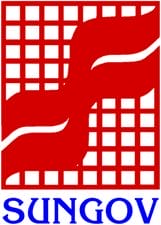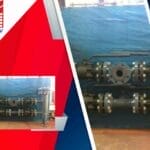The self-cleaning water filtration system operates continuously within critical fluid circuits. High level of solid contamination is effectively managed, thus eliminating the need for shutdowns. This capability is particularly valuable in applications such as water pre-treatment in wastewater filtration, cooling water circuits, and oil field injection circuits, where interrupting fluid flow is nearly impossible. To ensure an uninterrupted flow of filtered fluid without the need for filter element changes or cleaning stoppages is a need for technology. Enter online self-cleaning filters! These filters leverage the inherent principles of fluid flow, moving from high pressure to low pressure. A Differential Pressure Transmitter on the filter sends a signal to a control system, which can be a local control panel (equipped with PLC/PID/Relay control) a remote plant DCS featuring appropriate Control Logic, or a combination of both. This control system initiates the opening of the backwash valve and the rotation of the motorized backwashing pipeline, fully automating the filter cleaning process—hence the term “self-cleaning.”
Self-Cleaning Water Filtration Systems: Their Evolution
There have been significant advancements in technology and design of the self-cleaning water filtration system. There has always been a need for more efficient and continuous filtration processes. Over time, these systems have undergone several key developments:
Traditional Filtration Methods:
Early water filtration systems relied on conventional methods such as sand filtration and media filtration. While effective to some extent, these systems required frequent manual intervention for cleaning and maintenance.
Introduction of Automatic Filtration:
The need for automation led to the development of automatic filtration systems that incorporated mechanical devices to initiate the cleaning process. These systems reduced the reliance on manual labor but still faced limitations in terms of efficiency and adaptability to varying contamination levels.
Incorporation of Differential Pressure Technology:
One significant leap in the evolution came with the integration of differential pressure technology. By using sensors to measure pressure differentials across the filter, systems could now trigger the cleaning process only when necessary, optimizing resource usage and improving overall efficiency.
Advancements in Control Systems:
The evolution continued with the improvement of control systems. The integration of programmable logic controllers (PLC), proportional-integral-derivative (PID) controllers, and relay controls allowed for more precise and customizable control over the cleaning cycles based on real-time data.
Remote Monitoring and Control:
The advent of advanced communication technologies facilitated the transition to remote monitoring and control. With the implementation of distributed control systems (DCS) and the ability to connect to the Internet of Things (IoT), operators gained the capability to manage filtration systems from afar, enhancing overall operational flexibility.
Enhanced Backwashing Mechanisms:
Innovations in backwashing mechanisms, including motorized backwashing pipelines and optimized valve designs, further improved the efficiency of self-cleaning systems. These enhancements allowed for more thorough and automated cleaning processes, reducing the frequency of manual interventions.
Focus on Environmental Sustainability:
The latest trend in the evolution of self-cleaning water filtration systems involves a heightened focus on environmental sustainability. Systems now aim to minimize water and energy consumption during the filtration and cleaning processes, aligning with global efforts to reduce environmental impact.
What are the Advantages of Self-Cleaning Water Filtration Systems?
Self-cleaning water filtration systems offer several advantages over traditional filtration methods, enhancing efficiency, reliability, and ease of operation. Some key advantages of self-cleaning water filtrations include:
Continuous Operation:
Self-cleaning systems can operate continuously without the need for frequent shutdowns. This is particularly beneficial in applications where uninterrupted water flow is essential, such as in industrial processes, cooling water circuits, and oil field injection circuits.
Reduced Downtime and Maintenance Costs:
The automated cleaning process minimizes downtime and reduces the need for manual maintenance. This results in cost savings associated with labor, maintenance, and potential production losses that may occur during system shutdowns.
Optimized Filtration Efficiency:
By initiating the cleaning process only when necessary, self-cleaning systems optimize filtration efficiency. This ensures that the filter elements operate at their maximum capacity before cleaning, leading to improved overall performance and longer filter life.
Adaptability to Varying Contamination Levels:
Self-cleaning systems can adapt to fluctuating levels of solid contamination in the water. The use of differential pressure sensors allows the system to initiate cleaning cycles based on real-time conditions, ensuring effective filtration across a range of contamination levels.
Automation and Remote Monitoring:
The integration of automation technologies, such as programmable logic controllers (PLC), PID controllers, and remote monitoring capabilities, allows for convenient and efficient control of the filtration system. Operators can remotely monitor and adjust system parameters, enhancing overall operational flexibility.
Conservation of Water and Resources:
Self-cleaning systems optimize the use of water and resources by cleaning the filter elements only when necessary. This contributes to water conservation efforts and minimizes the environmental impact associated with excessive water usage in the cleaning process.
Enhanced Filtration Consistency:
The automated cleaning process ensures consistent filtration performance over time. This is particularly important in critical applications where variations in water quality could impact the efficiency of traditional filtration systems.
Improved System Longevity:
By reducing the stress on filter elements and minimizing wear and tear through optimized cleaning cycles, self-cleaning systems contribute to the overall longevity of the filtration system. This can result in a longer lifespan for the equipment and lower replacement costs.
Energy Efficiency:
Some self-cleaning systems are designed with energy-efficient features, contributing to overall sustainability. The use of advanced control systems and optimized backwashing mechanisms can lead to reduced energy consumption during the filtration and cleaning processes.
Compliance with Regulatory Standards:
The consistent and efficient operation of self-cleaning water filtration systems helps industries comply with regulatory standards for water quality. This is crucial in applications such as wastewater treatment, where adherence to environmental regulations is paramount.
How do the Self-Cleaning Water Filtration Systems by Sungov Engineering have a specific edge over the other filters?
Sungov Engineering’s High-Specification Filter allows optimal cleaning and at the same time are low maintenance filter with a robust 24/7 performance. Since the designs at Sungov Engineering are customizable, you get greater self-cleaning efficiency and filtration at your plant to suit your specific needs. When specified, we can ensure cathode protection to ensure that the filter elements serve you longer. Low Powered Geared Motors and the use of Exotic Materials for minimal energy consumption and improved resistance to corrosion, makes filters from Sungov Engineering your best low-cost alternative.
With our in-depth expertise in filtration technology and an unwavering commitment to excellence, we assure you that our design is optimally tailored for applications like cooling water pumps, boilers, and seawater intake pumps. If you are in search of online self-cleaning filters for your processes, your quest concludes with us! Feel free to reach out for further inquiries by giving us a call!




